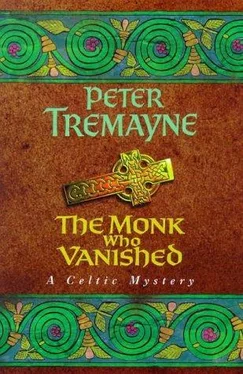Peter Tremayne - The Monk Who Vanished
Здесь есть возможность читать онлайн «Peter Tremayne - The Monk Who Vanished» весь текст электронной книги совершенно бесплатно (целиком полную версию без сокращений). В некоторых случаях можно слушать аудио, скачать через торрент в формате fb2 и присутствует краткое содержание. Жанр: Исторический детектив, на английском языке. Описание произведения, (предисловие) а так же отзывы посетителей доступны на портале библиотеки ЛибКат.
- Название:The Monk Who Vanished
- Автор:
- Жанр:
- Год:неизвестен
- ISBN:нет данных
- Рейтинг книги:3 / 5. Голосов: 1
-
Избранное:Добавить в избранное
- Отзывы:
-
Ваша оценка:
- 60
- 1
- 2
- 3
- 4
- 5
The Monk Who Vanished: краткое содержание, описание и аннотация
Предлагаем к чтению аннотацию, описание, краткое содержание или предисловие (зависит от того, что написал сам автор книги «The Monk Who Vanished»). Если вы не нашли необходимую информацию о книге — напишите в комментариях, мы постараемся отыскать её.
The Monk Who Vanished — читать онлайн бесплатно полную книгу (весь текст) целиком
Ниже представлен текст книги, разбитый по страницам. Система сохранения места последней прочитанной страницы, позволяет с удобством читать онлайн бесплатно книгу «The Monk Who Vanished», без необходимости каждый раз заново искать на чём Вы остановились. Поставьте закладку, и сможете в любой момент перейти на страницу, на которой закончили чтение.
Интервал:
Закладка:
‘I said I was sleeping at the forge when the attack took place. If Iam working late, then I sometimes do so. This house is my right as bó-aire. ’
Eadulf could not fault his response.
‘That is certainly so. And, as this is untouched while your forge is destroyed, it is certainly a lucky thing that you have the two houses. You do not have to have the indignity of having nowhere to sleep while your forge is being rebuilt.’
Nion made an expressive cutting motion with his hand. ‘You did not come here to congratulate me on my house, lady. Why are you here?’
‘I could not help noticing as I passed earlier, that my cousin and his warriors were here.’
‘Surely,’ the answer came back immediately. ‘Your cousin came to consult with me. I am, after all, the bó-aire. ’
‘That is fair enough.’ She paused. ‘What was Brother Bardan doing here then? Did he need to consult you … as bó-aire, of course?’
Nion did not even blink at the sharpness in her tone.
‘Of course,’ he affirmed.
‘I see. Is it a matter of confidentiality if I inquire about the subject of his visit?’
‘No.’ Nion shook his head. ‘Though I can’t think why you are interested. Bardán came here to ask me if I would be prepared to bury the body of the raider who was killed last night. I gave permission for it to be buried near the graves of our people. That is all.’
It did seem plausible. Yet there was something troubling Fidelma.
‘Where is Brother Bardan now?’
Nion spread a hand around the room in a gesture which invited her to search.
‘I have no idea where he is. He left here when that sly Uí Fidgente lawyer arrived to check the damage which his kinfolk had done.’
‘You did not see which way Brother Bardan went when he left your house?’ Fidelma pressed him.
‘No. If you recall, I followed you to see what the furore was about.’
‘You arrived after most other people,’ observed Eadulf, clearly irritated by the smith’s evasive attitude.
Nion pointed to his injured leg. ‘I cannot exactly hurry,’ he said sarcastically.
Eadulf flushed.
‘My comrade did not mean to be insensitive.’ Fidelma smiled apologetically. ‘However, you cannot even hazard a guess as to where Brother Bardan might have gone?’
‘No. He’s probably at the cemetery …’
‘We’ve just comes from there,’ Eadulf said.
‘Then try at the abbey.’
Fidelma moved towards the door and halted, turning back to the smith.
‘While Solam is here, treat him with the respect due to any visiting dálaigh. We have no proof that he is other than what he is. If any harm comes to him, the culprit is answerable to the law.’
When Nion made no reply, she lifted the latch and Eadulf followed her out into the street.
Outside they paused.
‘You sounded as if you suspected him of something?’ Eadulf reproached her.
‘Did I?’ she mused but said no more.
They walked in silence back to the abbey. Eadulf said nothing further for it seemed that Fidelma had sunk deep in thought and he felt it wiser not to interrupt her.
By the time they returned to the abbey its bell was tolling for the midday Angelus.
Fidelma and Eadulf exchanged no words as they went into the chapel. It was an automatic decision, made separately, to join the other worshippers. The psalm chanting was led by the Abbot Ségdae, who seemed to have recovered something of his old spirit. His voice rang out above the chanting of his congregation.
‘ Oculi omnium in Te aspiciunt et in Te sperant!’
The words stuck in Fidelma’s mind. She lowered her head and translated to herself: ‘The eyes of all things look to you and hope in you.’ It was as if Ségdae were reminding her of her responsibilities. Yet, for the first time in her life, she felt utterly confused. Usually, during the investigations she had undertaken, there was a single path to pursue. Now she found several paths and several mysteries that did not necessarily appear connected. But were they? She was not even sure.
She scarcely noticed the rest of service until the final psalm was sung and the congregation began shuffling towards the refectory for the etar-suth , or middle meal, of the day. As was the custom, all shoes and sandals were removed at the entrance to the refectory. She was hardly aware of removing her footwear, entering and sitting at one of the long, wooden dining tables. She was vaguely aware of Abbot Ségdae intoning the gratias in Latin then a soft murmur arose as the community began its meal.
As with most midday meals, it was a light meal of bread, cheese and fruits, with ale or water served, depending on taste. Fidelma ate mechanically, her mind still turning over the questions that vexed her mind.
Eventually she became aware of someone addressing her.
She glanced up and found it was the steward of the abbey, Brother Madagan, still wearing his bandage around his head and looking slightly pale but otherwise in good spirits. She realised that the refectory was almost empty now except for a few people, one of whom was Eadulf, who had been sitting by her side awaiting her to rouse from her thoughts. Brother Madagan slid onto a bench on the opposite side of the table.
‘I wanted to thank you and Brother Eadulf here for dragging me inside during the attack,’ Brother Madagan said. ‘I do not remember much between the time I was struck and coming to in the courtyard. It was Brother Tomar who told me what had happened. That poor misguided woman, Cred, struck down and poor young Brother Daig killed. You both risked your lives to save me.’
‘How is your wound, Brother, is it better?’ asked Fidelma, with a deprecating gesture. She found that, in spite of the steward’s effort to be friendly, there was nothing which endeared him to her. She still did not like him. The eyes were still cold and Fidelma felt that there was some merciless quality in the man.
‘Thanks be,’ acknowledged Brother Madagan. ‘The warrior luckily struck me on the skull with the flat of his sword. My head was pounding like the hammer of a smith on his anvil for a while. There is a lump the size of a camán ball.’
The camán ball, called a liathróid, was about four inches in diameter, made of some light, elastic material, such as woollen yarn, wound round and round and covered with leather. It was used in the game of hurley.
‘We thought that you had been killed for sure,’ Eadulf said.
‘The unGodly are not so easily victorious,’ Brother Madagan intoned piously. Yet there was a cold note of hatred in his voice.
‘Yet they inflicted much death and destruction,’ pointed out Fidelma.
Madagan’s eyes were like ice.
‘So Sister Scothnat has told me. Alas, I should not have tried to stop the raider by a plea to religious sanctuary. He could not have understood the term. Steel was all he understood.’
‘So you were regaining consciousness when you were dragged through the gates?’ asked Fidelma.
‘Yes. Though my mind is hazy and I think I was more unconscious than conscious. I remember feeling thankful when the abbey gates were banged shut. Then I do not remember much until I heard cheering. Sister Scothnat tells me that this was when your cousin, the Prince of Cnoc Aine, arrived and drove the raiders away.’
Fidelma looked thoughtful for a moment.
‘Do you remember being carried to your cell?’ she asked.
Madagan nodded slightly. He winced as the action caused the obvious ache to his cracked skull to worsen momentarily.
‘Do you remember anything beforehand?’
The steward considered for a moment. ‘Such as?’
‘You say that you remember being dragged into the courtyard?’
Читать дальшеИнтервал:
Закладка:
Похожие книги на «The Monk Who Vanished»
Представляем Вашему вниманию похожие книги на «The Monk Who Vanished» списком для выбора. Мы отобрали схожую по названию и смыслу литературу в надежде предоставить читателям больше вариантов отыскать новые, интересные, ещё непрочитанные произведения.
Обсуждение, отзывы о книге «The Monk Who Vanished» и просто собственные мнения читателей. Оставьте ваши комментарии, напишите, что Вы думаете о произведении, его смысле или главных героях. Укажите что конкретно понравилось, а что нет, и почему Вы так считаете.












